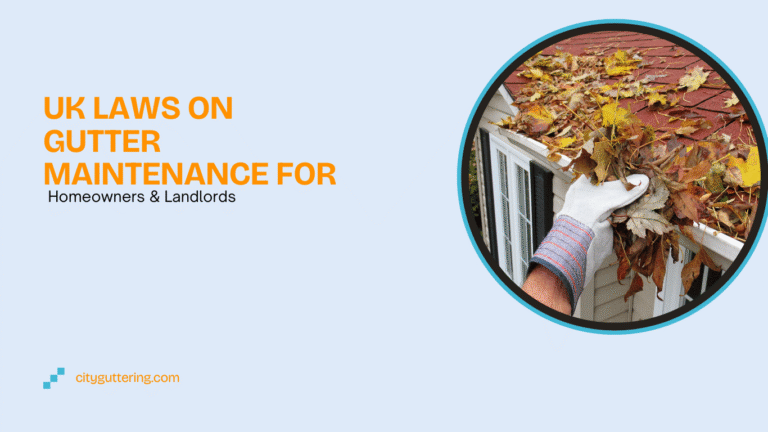Rain gutter size is one of those details most homeowners don’t think about until something goes wrong. Yet, choosing the right gutter size is one of the most important decisions you can make for protecting your property.
Gutters that are too small can’t handle heavy rainfall, leading to overflows, leaks, and water damage. Oversized gutters, on the other hand, may look bulky and unnecessary for smaller homes. The key is finding the perfect balance that matches your roof size, rainfall levels, and the design of your property.
If you live in London, Surrey, or nearby areas where rainfall can be unpredictable, knowing the right size of gutters for your home will save you both stress and repair costs in the long run.
Why Gutter Size Matters
The size of your gutters determines how effectively they can channel water away from your property. A gutter system that is too narrow will struggle to carry water during a storm, causing overflows that damage walls, fascias, and foundations. On the other hand, gutters that are properly sized will:
- Carry water efficiently without spilling.
- Prevent pooling near the foundation.
- Reduce the risk of leaks and water intrusion.
- Extend the lifespan of your roofline and drainage system.
Think of gutters as your home’s first line of defence against water damage. Choosing the right size means fewer repairs and greater peace of mind.

Standard Rain Gutter Sizes in the UK
Most UK homes are fitted with one of a few common gutter sizes. Knowing what’s typical can help you understand where your home fits.
- 100mm (4-inch): Usually for smaller properties or extensions.
- 112mm (4.5-inch): The most common size for standard residential homes in London and Surrey.
- 125mm (5-inch): Recommended for larger homes or roofs with a steeper pitch.
- 150mm (6-inch): Often used for commercial properties or homes with very large roof surfaces.
In addition to size, shape makes a difference. Half-round gutters carry less water than square or deep-flow gutters, even if the width is the same. That’s why squareline or ogee gutters are often preferred for heavy rainfall areas.
Factors That Determine the Right Gutter Size
Roof Size and Pitch
The larger your roof, the more water your gutters need to handle. Roof pitch also plays a role because a steep slope channels water faster, increasing the load on your system. As a rule of thumb, steeper and larger roofs need wider gutters.
Rainfall Intensity in London & Surrey
Local weather is a major factor in choosing gutter size. In areas like South London, Surrey, and Hampshire, sudden downpours are common. A gutter that’s too small for local rainfall conditions will overflow even if it looks fine on a sunny day.
Downspout Placement and Number
Even the biggest gutters won’t perform well if there aren’t enough downspouts. Each section of gutter should connect to a downspout that can handle the flow. Poor placement leads to overflows, sagging, and leaks.
Gutter Shape and Material
- Half-round gutters: Traditional style but limited capacity.
- Square or ogee gutters: Larger capacity, ideal for modern homes.
- PVC gutters: Affordable and low maintenance.
- Metal gutters: Durable and better suited to high-capacity systems.

Signs Your Gutters May Be the Wrong Size
How do you know if your current gutters aren’t right for your house? Here are the common warning signs:
- Water spilling over the sides during rain.
- Frequent leaks along joints and seams.
- Sagging gutters due to excess weight.
- Damp patches on walls or foundations.
- Overflowing even after cleaning.
If you notice these problems, it may not be a cleaning issue but a sizing issue that needs addressing.
Professional Gutter Sizing vs DIY Guesswork
Some homeowners try to guess gutter size when replacing their system, but this often leads to costly mistakes. Correct gutter sizing requires a professional assessment that takes into account:
- Roof area measurements.
- Roof pitch and slope.
- Local rainfall intensity.
- Proper downspout distribution.
Professionals like City Guttering London use these calculations to recommend the correct size for each home. This approach ensures that your gutters aren’t just installed but are designed to perform properly for years to come.
Cost Considerations for Different Gutter Sizes
Bigger gutters are more expensive upfront, but the cost difference is often small compared to the price of repairing water damage. For example:
- Standard 112mm gutters: Affordable and suitable for most homes.
- 125mm or 150mm gutters: Slightly higher in cost but ideal for larger or steeper roofs.
When you weigh the price of upgrading gutters against fixing a damp basement or repairing cracked brickwork, the investment is clear.

Local Expertise – City Guttering London’s Approach
At City Guttering London, we’ve worked with thousands of properties across South London, Central London, Surrey, and Hampshire. Our team doesn’t take a one-size-fits-all approach. Instead, we assess your roof, rainfall exposure, and drainage needs before recommending the right gutter system.
With over 200 five-star reviews, we’re trusted by homeowners and businesses alike. Our services include:
- Gutter cleaning and routine maintenance.
- Emergency gutter repairs for leaks and overflows.
- Full gutter replacements with correct sizing.
- Instant telephone inspections and free quotes within 45 minutes.
By choosing a local gutter expert, you’re ensuring that your gutters are fitted to handle the specific weather conditions in your area.
Conclusion
Choosing the right size rain gutters is one of the most important steps in protecting your home from water damage. From roof size and slope to local rainfall patterns, many factors affect which size is right for your property.
If you’re unsure whether your gutters are the right fit, don’t wait until damage occurs. City Guttering London offers professional advice, emergency repairs, and reliable gutter services tailored to homes across London, Surrey, and Hampshire.
Call today for a free inspection and quote within 45 minutes, and keep your home protected from the next downpour.
FAQs on Gutter Sizes
Q. 1 What’s the most common gutter size in the UK?
A. Most residential properties use 112mm gutters, which balance cost and performance.
Q. 2 Do larger gutters require more maintenance?
A. Not necessarily. Larger gutters handle debris better, but they still need regular cleaning.
Q. 3 Can I mix different gutter sizes on my property?
A. It’s possible but not recommended. A consistent system performs better.
Q. 4 How do I know if my gutters are too small?
A. If water regularly overflows during heavy rain despite cleaning, the size may be the issue.





